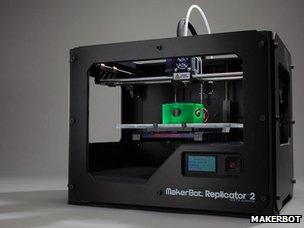Replicator maker talks up 3D printing tech
- Published

The new 3D printer is intended for industrial designers and artists
The gospel about 3D printing is being taken to the streets of New York.
MakerBot Industries, best known for its small 3D printers, has opened a shop in Manhattan through which it will aim to sell the joys of home fabrication to the general public.
The store opening comes as MakerBot releases the second incarnation of its Replicator 3D printer.
The Replicator 2.0 works to much finer resolutions than earlier versions and can fabricate much bigger objects.
Supply side
MakerBot said the store, the first of its kind, would act as a showcase for 3D printing and stage demonstrations and workshops for those who were curious about the technology.
3D printing involves building up objects layer by layer out of plastic that is melted and fed via a carefully controlled nozzle to form a shape. The printers were initially used in engineering and design firms to produce and refine prototypes.
Now many home hackers, makers and artists use 3D printers to turn out their own customised creations. Examples include model soldiers, cases for home electronic projects, and furniture for dolls' houses.
Bre Pettis said the Replicator 2.0 was aimed at the "prosumer" - either a design professional or a hardcore hobbyist. The device costs $2,199 (£1,360) and builds objects up in layers only 100 microns thick. In previous versions, each layer was about 270 microns thick.
Mat Fordy, founder and boss of coolcomponents.co.uk that sells 3D printers and other home hacking gear, said the technology was proving popular.
"We've really seen the affordable 3D printer market in the UK explode over the last couple of years," he told the BBC. "Many types of people use them, not just professionals, but people who have an idea that they need to touch and hold."
He said the new MakerBot was a great looking piece of kit but supply problems had made it hard to get hold of.
"They never seem to have enough to go around, and that puts a lot of people off," he said. "Other excellent printers are in ready supply, and many people just give up waiting and get one of those instead."
- Published14 September 2012
- Published31 August 2012
- Published2 July 2012
- Published8 March 2012